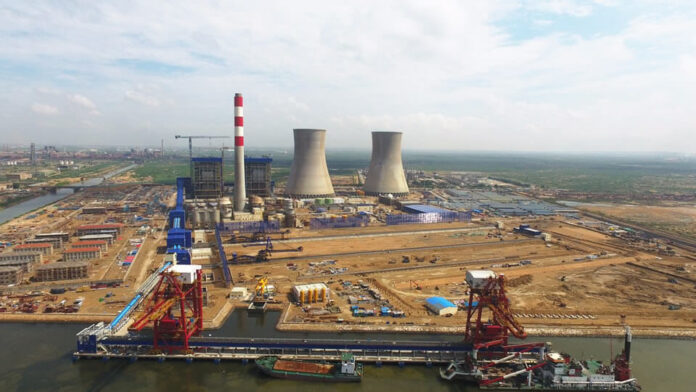ISLAMABAD: In a worrying turn of events, the Chinese government through its embassy in Islamabad had written a letter on February 3, 2023, to Khurram Dastagir, the minister for energy. According to the letter, “CPEC coal fired power plants now face the difficulty of buying coal due to the foreign exchange restriction”.
The letter also expressed its concern regarding the shut down of power plants, “among which the Port Qasim Power Plant has to be shut down as the coal has run out”. Furthermore, the Chinese expressed their concern regarding capacity payments.
The letter read, “the company [Port Qasim Electric Power Company] could not get electricity payment, nor the capacity payment, facing a very difficult situation”. The power plant utilises imported coal and has a generation capacity of 1320 MW.
In a separate letter to the ministry of energy, dated February 14, 2023, the Port Qasim Electric Power Company told the minister that both units of the power plant (with a combined generation capacity of 1320 MW) have been shut down.
Expanding on this, the CEO of the company Guo Guangling explained in the letter that, “due to outstanding foreign exchange requests with the SBP (State Bank of Pakistan), the coal supplier discontinued shipments after January, 2023”.
These external conditions have caused immense pressure on both the finances and the inventory of coal kept by the company, leading to a depletion of the standing inventory and an inability to import new stocks. They had no choice but to shut down the power plant.
Similarly, several unconfirmed reports from sector experts also indicate that the three other power plants reliant on imported coal have also shut down owing to their inability to procure coal.
Contrary to these claims, some experts who prefer to remain anonymous have stated that these plants are non-operational due to low overall electricity demand, and also that power plants using imported coal are more expensive compared to those using hydel, solar, nuclear and domestic coal.
Energy from coal
According to the latest data published by NEPRA, in the month of January coal accounted for 28.7% of the country’s total energy consumption at an aggregate cost of Rs 16.11/kwh.
To have a better understanding of the overall energy coming from coal, it would be prudent to break it down into two parts. Firstly the energy being contributed by power plants utilising imported coal; and secondly, power plants using domestically mined coal from Thar.
Currently, there are four coal power plants utilising imported coal to produce electricity. These have a total generation capacity of 4620 MW accounting for 63.6% of the total energy production from coal.
There are also a total of four power plants currently utilising Thar coal and have a combined generation capacity of 2640 MW making up the remaining 36.36% of the total energy production from coal.
Domestic coal
As the situation with power plants using imported coal deteriorates, plants reliant on local coal also face a certain degree of uncertainty going forward. In a letter written by Sindh Engro Coal Mining Company (SECMC) at the start of the year to the Ministry of Energy, the company expressed its concern regarding the opening of letters of credit and remittances to foreign suppliers.
The letter reads that, “since there was a significant delay in the approval of opening of letters of credit and foreign remittances, our [SECMC] mine operations are severely affected”.
According to it, the overall financial setback would be USD 40 millions if the mine doesn’t operate for a month. That was at the time when there were only three power plants using Thar coal, now there’s a fourth power plant so the impact would be higher.
However, according to a source familiar with the matter, so far the restrictions on the import of “tyres and spare parts” have not directly affected the productivity of the mine at 7.8 million tonnes per annum.
And according to the same source the issue of payments continues to persist and no resolution has been reached thus far. If the issue is not resolved mining operations and production will be directly impacted.
Interestingly enough though, primary suppliers of SECMC are also Chinese, and therefore the recent letter written by the Chinese embassy in Islamabad is more worrisome, highlighting the already precarious situation of the country.
The effects of a shut-down at the SECMC mine in Thar would be staggering as it would have a domino effect, particularly concerning power plants using domestic coal for power generation.
Now with the summer months around the corner, months which are predicted to be the hottest yet, Pakistan could face very heavy load shedding as demand for electricity steadily increases.





great information
I lost my Job few months ago,my wife left me ,could not get income for my family, things was so tough and I couldn’t get anything for my children, not until a met a recommendation on a page writing how Mr Bernie Wilfred helped a lady in getting a huge amount of profit every 6 working days on trading with his management on the cryptocurrency Market, to be honest I never believe it but I took the risk to take a loan of $2000. and I contacted him unbelievable and I was so happy I earn $22,500 in 6 working days, the most joy is that I can now take care of my family I don’t know how to appreciate your good work Mr. Bernie Doran God will continue to bless you for being a life saver I have no way to appreciate you than to tell people about your good trade management system. For a perfect investment and good strategies contact Mr Bernie Doran via WhatsApp : + 1(424)285-0682 or Telegram : Bernie_fx or Gmail : Bernie.doranfx01gmailcom